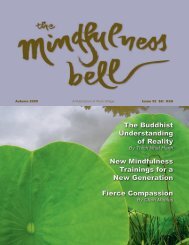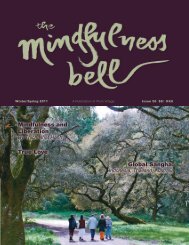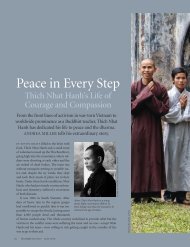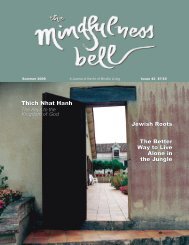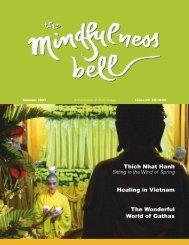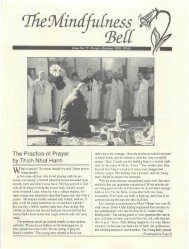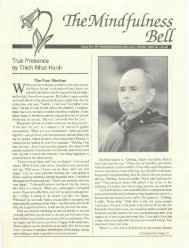Download - The Mindfulness Bell
Download - The Mindfulness Bell
Download - The Mindfulness Bell
Create successful ePaper yourself
Turn your PDF publications into a flip-book with our unique Google optimized e-Paper software.
talks from VESAK<br />
to embody mindfulness while they care for and serve their clients<br />
increased in wholesome ways.<br />
We now offer annual family retreats for couples and for families<br />
with children. Young people are getting together for camps<br />
— songs, art, poetry, yoga, and meditation practice; this is a very<br />
successful annual gathering of young people. Students have had<br />
special retreats designed to introduce them to the benefits and<br />
principles of mindfulness practice.<br />
Over the last few years we have offered “people of color”<br />
retreats in the United States for minorities to support these individuals<br />
and groups in the practice of mindfulness. This effort is<br />
enabling the teachings to go with people back to the neighborhoods,<br />
communities, and local institutions. I can report to you<br />
that there are schools in the United States where the classroom<br />
morning begins with the sound of the bell. I can report to you that<br />
there are young people in difficult situations who come to class<br />
and enjoy meditation and the tea ceremony.<br />
Thay has already mentioned the work at Plum Village with<br />
Palestinians and Israelis, but you should also know that many of<br />
our colleagues are creating special initiatives on their own that are<br />
taking place every week, every day, to build peace and to foster<br />
reconciliation.<br />
We have had gatherings of business people to talk about<br />
mindfulness and ethics and what it means to be a business person<br />
who practices mindfully. This includes mindfully developing<br />
products and mindfully managing their profit. <strong>The</strong> Buddha did<br />
not complain about business people, the Buddha only wanted to<br />
make sure that we made money the right way, without causing<br />
suffering, and that when we made it, we spent it the right way,<br />
without causing suffering.<br />
We’ve had veterans’ retreats in the United States, for many<br />
years offered by Thay and the Plum Village Sangha. You may have<br />
already encountered the tremendous transformation and healing of<br />
some of the veterans of many wars, including the Vietnam War.<br />
What We Are Learning<br />
What we are learning through the process of offering so many<br />
different kinds of retreats and mindfulness days to so many different<br />
people and professions is three-fold. First, the post-modern<br />
mind or soul is seeking an experience of transformation and healing<br />
more than an explanation of transformation and healing. If an<br />
explanation comes along after I’m healed, or while I’m getting<br />
healed, it’s deeply appreciated.<br />
<strong>The</strong> second thing we are learning is that offering the medicine<br />
of our tradition is not a matter of conversion. It is not a question<br />
of religious roots but rather a question of generating authentic<br />
aspiration. This is a matter of offering the Buddhist teaching with<br />
clarity and practical relevance through humble sincerity.<br />
<strong>The</strong> third aspect is that this way of transmitting the teachings<br />
is about application and translation. Depth scholarship is certainly<br />
important but we must find new ways it can be applied to the suffering<br />
that is pervasive in our time and space. This is crucial if we<br />
are to untie the internal and social knots that block us from our<br />
best selves and best societies.<br />
Seeds of a New Society<br />
So the true value of the teaching is not trapped in the form of<br />
its delivery. Skillful means is one of the fundamental teachings the<br />
Buddha has given us to help living beings to relieve their suffering.<br />
<strong>The</strong> practices that we have been given by the Buddha and all of our<br />
teachers after him can be applied in every kind of situation — if<br />
we apply them without attachment to form.<br />
In the midst of these very concrete retreats and mindfulness<br />
days we have found that sometimes the Dharma Gates of Liberation<br />
open wide. While sharing the practices of sitting, walking,<br />
eating meditation, deep relaxation, Dharma talks and discussion,<br />
deep listening, and loving speech, people find themselves not only<br />
healed but transformed.<br />
If you look and listen closely, you will see that we are in the<br />
midst of a new kind of society. But the kind of society that you and<br />
I would be happy living in, and most people I know on this planet<br />
would be happy living in, is not yet here. <strong>The</strong> seeds of it are here.<br />
However, the new society that is just, democratic, and civilized<br />
can only take place on the ground of a new spiritual sensibility.<br />
And, brothers and sisters, we are that ground — the ground of that<br />
fresh spiritual sensibility of the post-modern age.<br />
You may ask where the Buddha is in all of this. Master Lin<br />
Chi reminds us that the Buddha is not a statue. Other ancestral<br />
teachers remind us if we are going to find the Buddha we should<br />
look close, close to where we are, close to our heart, close to our<br />
own mind, or we will not find him, or we will not find her.<br />
In closing I offer you a poem from this week’s experience:<br />
We engage through our love,<br />
opening 10,000 Dharma Doors<br />
with a true mind and a true heart.<br />
What do we call this urgency, this Buddhism<br />
It matters not.<br />
<strong>The</strong> sun rises and the moon shines without confusion.<br />
Listen to the frogs — do they remind you of anyone<br />
<strong>The</strong> bamboo chimes dance in the wind without clinging.<br />
Our chants sing out beauty<br />
like the birds greeting the morning sun.<br />
We are here to be engaged, to remember the promise<br />
we made, many lifetimes ago,<br />
the promise not to leave anyone behind,<br />
the promise not to ignore the suffering of any being.<br />
<strong>The</strong> promise to remember our noble calling —<br />
It has not changed.<br />
It is still: Wake up, wake up, wake up.<br />
Larry Ward is a Dharma Teacher in the Order of Interbeing<br />
and he is currently pursuing a doctorate in Religious Studies<br />
(Buddhism) from Claremont Graduate University in California.<br />
He is co-author with Peggy Rowe-Ward of Love’s Garden: A<br />
Guide to Mindful Relationships (Parallax Press, 2008).<br />
18 Winter/Spring 2009



